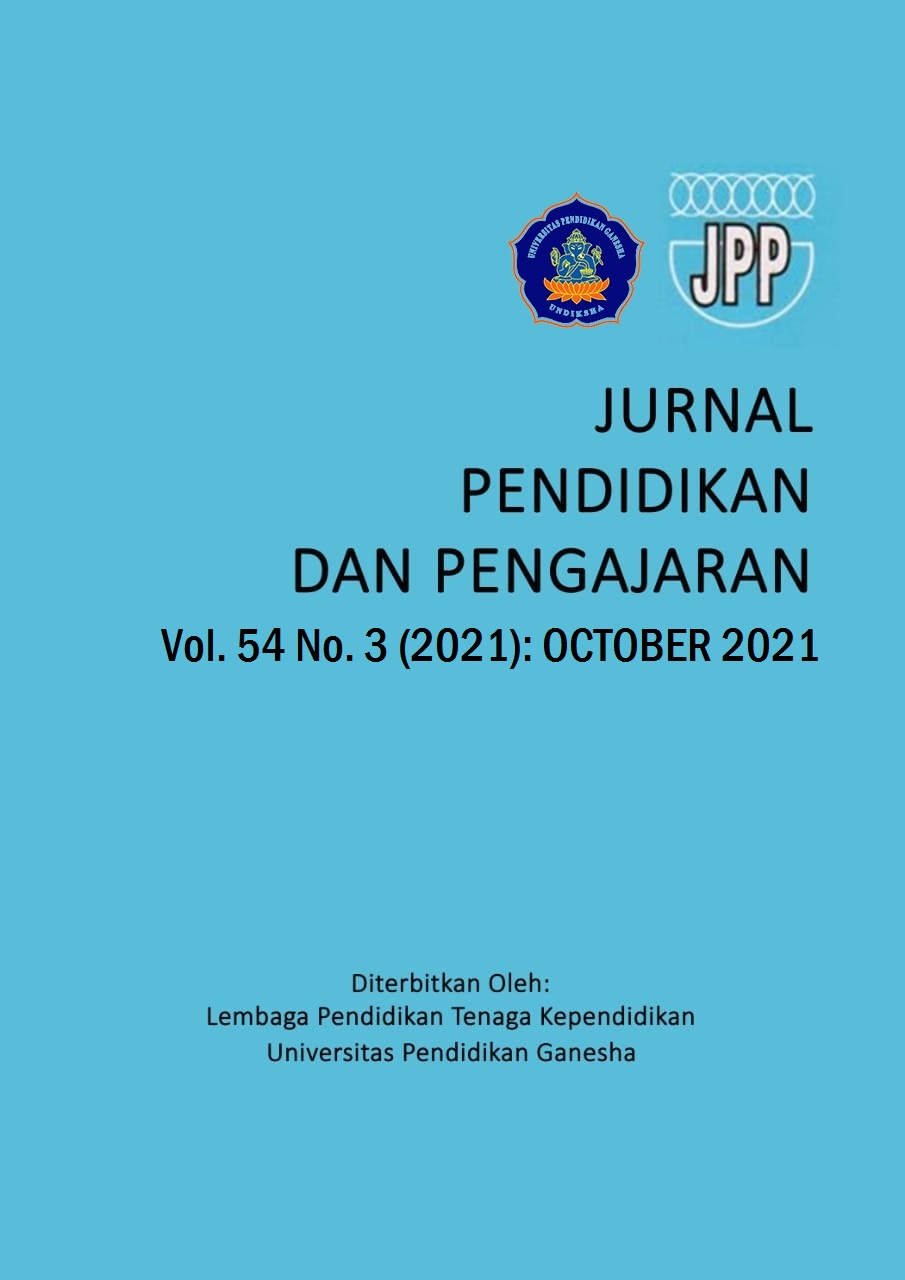On-Task and Off-Task Self-Assessment: Which Works Better on Young Learners’ Writing Performance?
DOI:
https://doi.org/10.23887/jpp.v54i3.40895Keywords:
self-assessment, on-task self-assessment, off-task self-assessment, young learners, writingAbstract
The implementation of self-assessment might contribute to the young learners’ English proficiency and affective domain. Yet, there is still limited findings found for the effect on young learners’ writing performance. This experimental study investigated the effect of on-task and off-task self-assessment on young learners of English as a foreign language in Bali, Indonesia. 46 sixth graders participated in this study were required to do self-assessment in completing their writing prompt. A self-assessment checklist was used as the instrument. The on-task self-assessment group applies the self-assessment checklist at every stage of their writing process, namely pre-writing, drafting, revising, editing, and publishing. On the other hand, the off-task self-assessment group uses the self-assessment checklist before they start the writing process. Using independent samples t-test for hypothesis testing, it was found that there is no significant difference in both groups’ writing performance since the real probability that is due to sampling error is .194 which is bigger than the significance level of .05. Therefore, self-assessment could be implemented in on-task and off-task since it brings similar effect to the young learners’ writing performance.
References
Andrade, H., & du, Y. (2007). Student responses to criteriareferenced self-assessment. Assessment and Evaluation in Higher Education, 32(2), 159–181. https://doi.org/10.1080/02602930600801928.
Andrade, H. G., & Boulay, B. A. (2003). Role of rubric-referenced self-assessment in learning to write. The Journal of Educational Research, 97(1), 21–34. https://doi.org/10.1080/00220670309596625.
Baleghizadeh, S., & Masoun, A. (2013). The Effect of Self-Assessment on EFL Learners’ Self-Efficacy. TESL Canada Journal, 31(1), 42–58. http://teslcanadajournal.ca/index.php/tesl/article/view/1166.
Birjandi, P., & Tamjid, N. H. (2012). The role of self-, peer and teacher assessment in promoting Iranian EFL learners’ writing performance. Assessment and Evaluation in Higher Education, 37(5), 513–533. https://doi.org/10.1080/02602938.2010.549204.
Brown, H. D., & Lee, H. (2015). Teaching by Principles: An Interactive Approach to Languag Pedagody. Alijafarnode.
Butler, Y. G. (2009). How do teachers observe and evaluate elementary school students’ foreign language performance? A case study from South Korea. TESOL Quarterly, 43(3), 417–444. https://doi.org/10.1002/j.1545-7249.2009.tb00243.x.
Butler, Y. G., & Lee, J. (2006). On-Task versus Off-Task Self-Assessment among Korean Elementary School Students Studying English. The Modern Language Journal, 90(4), 506–518. https://doi.org/10.1111/j.1540-4781.2006.00463.x.
Butler, Y. G., & Lee, J. (2010). The effects of self-assessment among young learners of English. 7(1), 5–31. https://doi.org/10.1177/0265532209346370.
Cameron, L. (2010). Teaching Language to Young Learners. Cambridge University Press.
Carless, D. (2005). Prospects for the implementation of assessment for learning. Assessment in Education: Principles, Policy and Practice, 12(1), 39–54. https://doi.org/10.1080/0969594042000333904.
Dann, R. (2012). Promoting Assessment as Learning (1st ed.). Routledge. https://doi.org/10.4324/9780203470152.
Earl, L. M. (2013). Assessment as Learning: Using Classroom Assessment to Maximize Student Learning. Corwin.
Earl, L. M., & Katz, S. (2006). Rethinking Classroom Assessment with Purpose in Mind: Vol. 2nd ed (Issue November). Crown.
Graves, D., Tuyay, S., & Green, J. (2004). What I’ve Learned from Teachers of Writing. Language Arts, 82(2), 88–94. https://search.proquest.com/openview/5b82d50a19d4eaa0f7b35211675d4d40/1?pq-origsite=gscholar&cbl=41436.
Johnson, C., & Gelfand, S. (2013). Self-Assessment and Writing Quality. Academic Research International, 4(4), 571–581.
Le´ger, D. de Saint. (2009). Self-Assessment of speaking skills and participation in a foreign language class. Foreign Language Annals, 42(1), 158–178. https://doi.org/10.1111/j.1944-9720.2009.01013.x.
Paris, S. G., & Paris, A. H. (2001). Classroom applications of research on self-regulated learning. Educational Psychologist, 36(2), 89–101. https://doi.org/10.1207/S15326985EP3602_4.
Schraw, G. (1998). Promoting general metacognitive awareness. Instructional Science, 26, 113–125. https://doi.org/10.1023/A:1003044231033.
Schulz, M. M. (2009). Effective writing assessment and instruction for young english Language Learners. Early Childhood Education Journal, 37(1), 57–62. https://doi.org/10.1007/s10643-009-0317-0.
Shahrakipour, H. (2014). On the Impact of Self-Assessment on EFL Learners’ Receptive Skills Performance. International Research Journal of Art & Humanities, 40(40), 143–164. http://ejournal.ukm.my/ajtlhe/article/view/11901.
Suzuki, R. (2005). Review of " Self-esteem of Japanese College Students : Suggestions based on Research on How to Foster Their 『 自信力が学生を変える : 大学生意識調査からの提言 』. Language Teaching, 2(2), 71–73.
Suzuki, Y. (2015). Self-assessment of Japanese as a second language: The role of experiences in the naturalistic acquisition. Language Testing, 32(1), 63–81. https://doi.org/10.1177/0265532214541885.
Yoon, E., & Lee, H.-K. (2013). Do Effects of Self-Assessment Differ by L2 Language Level ? A Case of Korean Learners of English. Asia-Pacific Edu Res, 22(4), 731–739. https://doi.org/10.1007/s40299-013-0111-z.
Downloads
Published
How to Cite
Issue
Section
License
Authors who publish with Jurnal Pendidikan dan Pengajaran agree to the following terms:- Authors retain copyright and grant the journal the right of first publication with the work simultaneously licensed under a Creative Commons Attribution License (CC BY-SA 4.0) that allows others to share the work with an acknowledgment of the work's authorship and initial publication in this journal
- Authors are able to enter into separate, additional contractual arrangements for the non-exclusive distribution of the journal's published version of the work (e.g., post it to an institutional repository or publish it in a book), with an acknowledgment of its initial publication in this journal.
- Authors are permitted and encouraged to post their work online (e.g., in institutional repositories or on their website) prior to and during the submission process, as it can lead to productive exchanges, as well as earlier and greater citation of published work. (See The Effect of Open Access)





